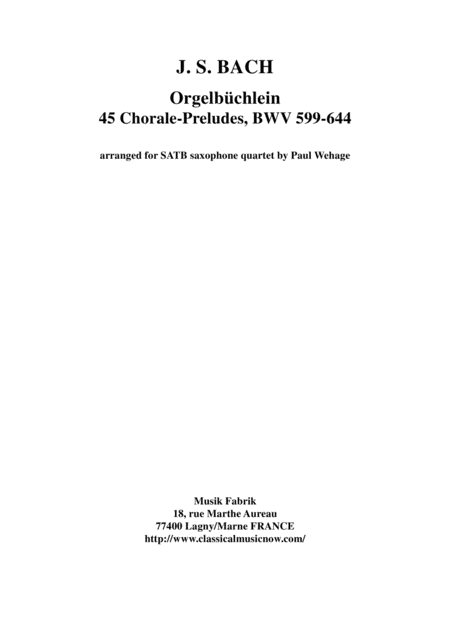Woodwind Ensemble,Woodwind Quartet Alto Saxophone,Baritone Saxophone,Soprano Saxophone,Tenor Saxophone - Level 4 - Digital Download SKU: A0.534471 Composed by Johann Sebastian Bach. Arranged by Paul Wehage. Baroque,Christmas,Easter,Sacred. 207 pages. Musik Fabrik Music Publishing #3520187. Published by Musik Fabrik Music Publishing (A0.534471). The Orgelbüchlein (Little Organ Book) BWV 599−644 is a collectionof 45 chorale preludes for organ written by Johann Sebastian Bach. Allbut three of them were composed during the period 1708–1717, whileBach was court organist at the ducal court in Weimar. The remainingthree, along with a short two-bar fragment, were added in 1726 or later,after Bach's appointment as cantor at the Thomasschule in Leipzig. The45 comlete pieces are divided up according to the liturigcal year:L’Orgelbüchlein (Le Petit LIvre D‘Orgue) BWV 599−644 est unecollection de 45 chorale preludes for organ écrites par Johann SebastianBach. Tout, sauf trois ont été composées pendant la période ou Bach étaitl’organiste titualaire au cour du Duc de Weimar entre 1708 et 1717, whileBach was court organist at the ducal court in Weimar. Les trois resentanteont été ajoutée vers 1726, après la nomination de Bach comme Maître deChapelle au Thomasschule à Leipzig. Les 45 pièces sont divisée selonThe 45 comlete pieces are divided up according to the liturigcal year:Advent /Avent1. Nun komm' der Heiden Heiland, BWV 599 (A minor)2. Gott, durch deine Güte, BWV 600 (F major)3. Herr Christ, der einge Gottessohn, BWV 601 (A major)4. Lob sei dem allmächtigen Gott, BWV 602 (D minor)Christmas/Noël5. Puer natus in Bethlehem, BWV 603 (G minor)6. Gelobet seist du, Jesu Christ, BWV 604 (G major)7. Der Tag, der ist so freudenreich, BWV 605 (G major)8. Vom Himmel hoch, da komm ich her, BWV 606 (D major)9. Vom Himmel kam der Engel Schaar, BWV 607 (G minor)10. In dulci jubilo, BWV 608 (A major)11. Lobt Gott, ihr Christen, allzugleich, BWV 609 (G major)12. Jesu, meine Freude, BWV 610 (C minor)13. Christum wir sollen loben schon, BWV 611 (E minor)14. Wir Christenleut', BWV 612 (G minor)New Year/Nouvelle Année15. Helft mir Gottes Güte preisen, BWV 613 (B minor)16. Das alte Jahr vergangen ist, BWV 614 (A minor)17. In dir ist Freude, BWV 615 (G major)Epiphany (Feast of the Purification)18. Mit Fried’ und Freud’ ich fahr’ dahin, BWV 616 (D minor)19. Herr Gott, nun schleuß den Himmel auf, BWV 617 (A minor)Passion20. O Lamm Gottes, unschuldig, BWV 618 (F major)21. Christe, du Lamm Gottes, BWV 619 (F major)22. Christus, der uns selig macht, BWV 620 (A minor)23. Da Jesus an dem Kreuze stund, BWV 621 (A minor)24. O Mensch, bewein’ dein’ Sünde groß, BWV 622 (E-flat major)25. Wir danken dir, Herr Jesu Christ, BWV 623 (G major)26. Hilf, Gott, daß mir's gelinge, BWV 624 (G minor)Easter/Pâques27. Christ lag in Todes Banden, BWV 625 (D minor)28. Jesus Christus, unser Heiland, BWV 626 (A minor)29. Christ ist erstanden, BWV 627 (D minor)30. Erstanden ist der heil’ge Christ, BWV 628 (D major)31. Erschienen ist der herrliche Tag, BWV 629 (D minor)32. Heut’ triumphiret Gottes Sohn, BWV 630 (D minor)Pentecost/Pentecôte33. Komm, Gott Schöpfer, Heiliger Geist, BWV 631 (G major)34. Herr Jesu Christ, dich zu uns wend’, BWV 632 (F major)35. Liebster Jesu, wir sind hier, BWV 633 (A major)Cathechism36. Dies sind die heil’gen zehn Gebot’, BWV 635 (C major)37. Vater unser im Himmelreich, BWV 636 (D minor)38. Durch Adam’s Fall ist ganz verderbt, BWV 637 (A minor)39. Es ist das Heil uns kommen her, BWV 638 (D major)Christian life/Vie Chrétienne40. Ich ruf’ zu dir, Herr Jesu Christ, BWV 639 (F minor)41. In dich hab’ ich gehoffet, Herr, BWV 640 (E minor)42. Wenn wir in höchsten Nöthen sein, BWV 641 (G major)43. Wer nur den lieben Gott lässt walten, BWV 642 (A minor)Death and Burial/La Mort et l’Enterrement44. Alle Menschen müssen sterben, BWV 643 (G major)45. Ach wie nichtig, ach wie flüchtig, BWV 644 (G minor)
